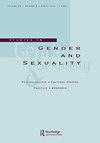超越#MeToo:故事中(女性)代理和Après-Coup的治疗作用1
Q3 Social Sciences
引用次数: 0
摘要
摘要本文从#MeToo运动的角度,对詹妮弗·福克斯的自传体故事片《故事》进行了思考,这部电影与电影的上映不谋而合。福克斯对她13岁时写的真实故事的忠实吸引了观众解构明确的受害者/施暴者、受害者/幸存者、真相-小说、记忆-欲望的二元对立;无所不能——代理;胁迫-同意;当时&现在;心理&躯体;幻想-现实;以及父权制特权——女性的声音。这部电影揭示了真理的主体间维度,即欲望与对认识(自己、他人)的破坏之间的较量。它拒绝童年幻想和创伤诱惑之间的任何二分法,坚持他们被诱捕的困惑现实和持续影响。最有力的是,这部电影见证了(女性)能动性的力量和治疗作用,并证明了真相的偶然性,因为我们见证了主人公——在现在的声音和当时的声音之间——富有想象力地改写了她过去和现在的经历。本文章由计算机程序翻译,如有差异,请以英文原文为准。
Beyond #MeToo: The Therapeutic Action of (Female) Agency and Après-Coup in The Tale1
ABSTRACT This essay considers Jennifer Fox’s largely autobiographical feature film The Tale from the vantage point of the #MeToo movement, which coincided with and contextualized its release. Fox’s fidelity to an actual story she wrote at age 13 enlists the viewer in deconstructing the binaries of unambiguous victim/perpetrator, victim/survivor, truth–fiction, memory–desire; omnipotence–agency; coercion–consent; then–now; psyche–soma; fantasy–reality; and patriarchal privilege–women’s voices. The film reveals the intersubjective dimension of truth as a contestation between desire and destruction of knowing (oneself, the other). It refuses any dichotomy between childhood fantasy and traumatic seduction, insisting on the perplexing reality and persistent effects of their ensnarement. Most powerfully, the film bears witness to the power and therapeutic action of (female) agency, and attests to the après-coup or afterwardsness of truth, as we witness the protagonist—between a voice of now and a voice of then—imaginatively rewrite her experience of the past in the present.
求助全文
通过发布文献求助,成功后即可免费获取论文全文。
去求助
来源期刊

Studies in Gender and Sexuality
Social Sciences-Gender Studies
CiteScore
0.80
自引率
0.00%
发文量
15
期刊介绍:
Beginning in the final two decades of the 20th century, the study of gender and sexuality has been revived from a variety of directions: the traditions of feminist scholarship, postclassical and postmodern psychoanalytic theory, developmental research, and cultural studies have all contributed to renewed fascination with those powerfully formative aspects of subjectivity that fall within the rubric of "gender" and "sexuality." Clinicians, for their part, have returned to gender and sexuality with heightened sensitivity to the role of these constructs in the treatment situation, including the richly variegated ways in which assumptions about gender and sexuality enter into our understandings of "normality" and "pathology."
 求助内容:
求助内容: 应助结果提醒方式:
应助结果提醒方式:


